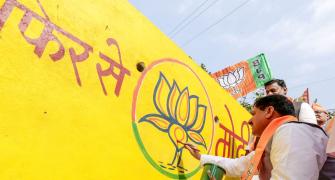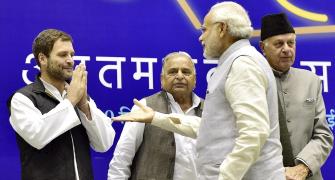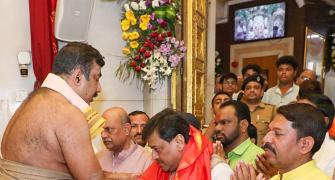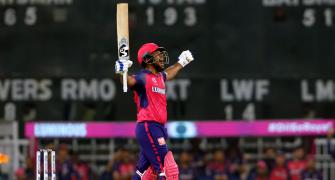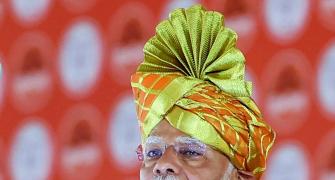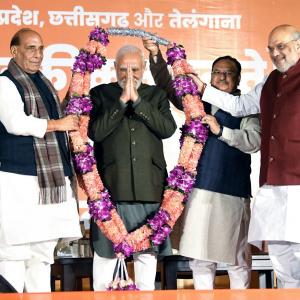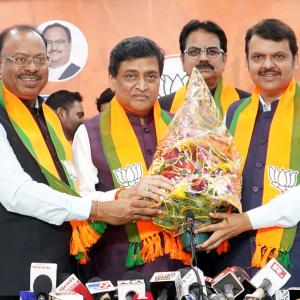'My suspicion is that most of the bonds were given by companies who had got contracts or who had benefited from policy changes by the government.'

\
Supreme Court Advocate Prashant Bhushan argued for the petitioners in the electoral bonds case which squashed the Narendra Modi government's law that allowed for unlimited, secret corporate funding of political parties through electoral bonds.
"Unless there is a stay on the judgment, they (the Modi government) have to comply with it (the judgment) and if they don't comply, it amounts to contempt," Prashant Bhushan tells Prasanna D Zore/Rediff.com.
You were one of the lawyers who argued for annulment of the electoral bond scheme. How do you look at the Supreme Court judgment that has gone in your favour?
It's a very important and significant judgment, not only for striking down this sort of anonymous and dishonest scheme for political funding through electoral bonds, but it also underlines how our electoral democracy has become a game of money.
The judgment also points out that there is a great dichotomy between the fact that there is a limit on spending by individual candidates, but there is no limit on spending by political parties.
It's also important because it strikes down the removal of restrictions on corporate funding of political parties.
Finally, it's very important because it asks the State Bank of India to disclose the details of who purchased the bonds and which parties received those bonds.
Now, this will shed a lot of light on whether there was a quid pro quo. My suspicion is that most of the bonds were given by companies who had got contracts or who had benefited from policy changes by the government.
A lot of it (money received by political parties via electoral bonds) would be quid pro quo.
A lot of it would be just arm twisting, meaning they (the government) threaten them (the corporates) with (investigating agencies like the Enforcement Directorate, Central Bureau of Investigation and Income Tax department).
How easy would it be to prove this quid pro quo once the Election Commission publishes the names of these coprorates?
It would look like quid pro quo if the donations are made proximate to the policy changes or the contracts in favour of those corporate.
And then it's a matter for further investigation by an agency, by whatever.
Would you have any hope from the agencies to actually investigate and connect the dots?
No, I don't have much hope from these agencies. But the court can always set up an SIT as they did in the 2G case or in the Coalgate case. I would expect a court monitored investigation by the CBI (to find out if there was a quid pro quo).
The court monitors the investigations?
Yes. But given how the court has been behaving, I do not even expect the court to order court monitored investigations. But, of course, this judgment is a very important judgment, a very good judgment.
Could you tell us what are the far reaching consequences, if any, of this judgment?
The Supreme Court has mentioned that money power has been destroying our electoral democracy. The judgment has been a scathing judgment. It's quite a remarkable judgment in that sense.

Will this judgment bring more transparency and accountability so far as funding of elections in India is concerned?
Will the politicians tug at their moral compass now as the Supreme Court has struck at the heart of electoral funding in India?
This was quite a secret, opaque, way of electoral funding. Not that the system before that was full-proof.
But even now (after the judgment on electoral bonds), you can always give cash and a lot of the political parties can declare that cash as less than Rs 20,000, or less than Rs 2,000. They can say (this cash) petty cash, even if they take (collect) Rs 1,000 crore (through cash).
They can say this is all petty cash donors. And secondly, there is a lot of unaccounted cash flowing into political parties also. And it's not just political parties, it's also candidates. That's why I had been saying that if the government was serious about reining in (influence of black money on elections) when they did demonetisation (November 8, 2016) and Prime Minister (Narendra Modi) said, I want a cashless economy.
If he was serious about that, then he should have at least passed a law, a very simple amendment, saying that political parties and candidates will not be allowed to take money (in cash) or spend by cash. Everything should be through bank transactions.
Political parties and candidates contesting elections to the Lok Sabha, Rajya Sabha, Vidhan Sabha could have been forced by a law to spend in elections only through bank transactions.
The most striking feature of this judgment seems to be the Supreme Court asking the SBI to submit names of corporate donors by March 6 to the Election Commission, which in turn has to publish them before March 13.
Does this leave the Modi government any room to wiggle out of this situation?
Well, they can do two things. One is they can file a review and don't comply with this judgment and claim that we have filed a review. Therefore we are not complying. And they have 30 days to file the review. They can do that, but strictly speaking, that is not legal.
Unless there is a stay on the judgment, they have to comply and if they don't comply, it amounts to contempt. But then it's up to the Supreme Court to prosecute them for contempt.
The other option is to bring in a law (through a special session of Parliament). That law, as Kapil Sibal has pointed out, would be unconstitutional and would be struck down (by the Supreme Court).
But till it is struck down, they will claim that this law permits us not to disclose (the names of corporate donors and they won't).
This (judgment) certainly is a big slap on the face of the Modi government.
Would you have reasons to believe that the Modi government could bring, as you said, bring in a law or an ordinance?
Yes, because they (all political parties) will be mortally scared of the disclosure of the (names of) corporates behind this funding, especially the BJP.
Can we now say that the Rs 16,000-odd crore that political parties have got through these electoral bonds is unconstitutional money and that all the political parties have this unconstitutional money in their custody?
Shouldn't all political parties -- including the ruling and the Opposition parties -- return that money back to the donors or to perhaps the Prime Minister's Relief Fund?
No, it's been struck down because there is lack of transparency. The law about the removal of (corporate) limit to political funding has been struck down. It's not that political donations are barred.
Companies can donate, but within that limit.
What our readers would like to know is this Rs 16,500 crore that has been generated through electoral bonds, unconstitutional money now?
No, I wouldn't say that.
Do you think political parties should take the moral high ground and return this money back to the corporates who donated it now that the Supreme Court has called the scheme itself unconstitutional and struck it?
They (all the political parties) will say that we don't know who has given it. They'll have to refund it to the State Bank of India, which will have to refund it to (the corporates).

